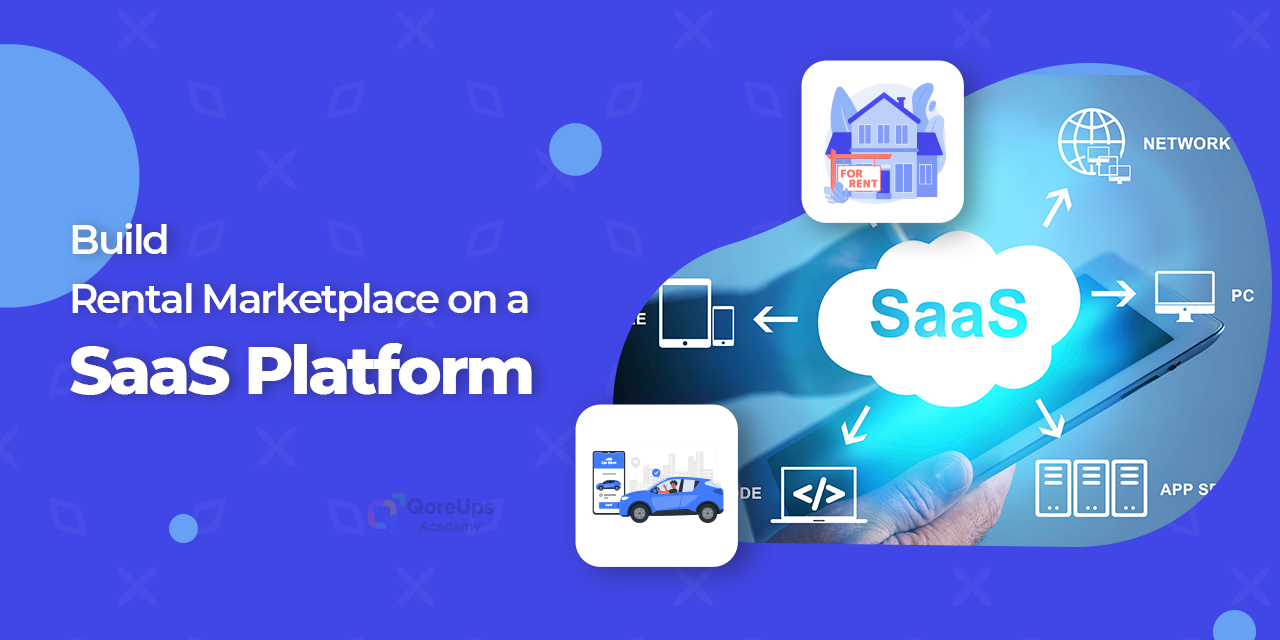You’re an aspiring business owner who is eager to enter the business world and is full of imagination and desire.
You’ve been looking at possibilities, generating ideas, and envisioning creating something that not only turns a profit but also changes the world.
Then it dawns on you: the idea of a rental marketplace.
However, why end there?
If you want your idea live as soon as possible, that’s where you can adopt SaaS rental platforms.
In this article, we’ll walk you through A to Z to build rental marketplace on a SaaS platform.
As well as explore their importance in the modern sharing economy and identify the essential components of a prosperous platform.
Are you prepared to take advantage of the world of business-to-business rentals that lie ahead?
Let’s get in and explore the possibilities to build rental marketplace.
What Are B2B Rental Marketplaces?
Businesses may rent tools, equipment, and services from one another more easily thanks to online platforms called B2B rental marketplaces.
By acting as middlemen, they link companies with extra resources with those who require them, creating a cooperative economy where resources are shared for the advantage of both parties.
From manufacturing and construction to logistics and event organizing, these platforms work in a variety of sectors.
Advantages Of B2B Rental Market Place Over Traditional Purchase Models
B2B rental marketplaces provide many clear advantages over typical purchasing methods. Among these are:
Cost-Effectiveness
One of the main benefits of rental market places is their capacity to provide financial savings for customers.
It may often be far less expensive to rent something than to buy it altogether, especially if it’s something you just need temporarily or once.
This is especially important for costly products like fancy clothes for special occasions, high-end technology, or equipment for do-it-yourself tasks.
Flexibility And Convenience
Rental market places provide an unrivaled level of flexibility and convenience.
Instead of making the long-term commitment needed for purchases, customers can rent things as needed.
For those who move around a lot, have changing needs, or like to try new things out before committing to a purchase, this type is quite practical.
Using applications or websites to streamline the rental and return process makes it easier and less stressful.
Sustainability
B2B rental marketplaces provide a more sustainable consumption paradigm by encouraging the sharing and reuse of items.
This method lessens the amount of trash produced and the environmental damage caused by the production, packing, and disposal of products.
For those who care about the environment, it’s a desirable alternative since it fits with the expanding consumer knowledge and concern about environmental concerns.
Access To A Wide Range Of Products
B2B rental marketplaces provide customers with access to a wide range of products that they may not otherwise find.
This covers everything, from high-end furnishings and cutting-edge technology to specialty tools for crafts or pastimes at home.
Customers’ lives can be improved by this kind of access, which enables them to pursue new hobbies or treat themselves to upscale events without having to pay the whole price of ownership.
Income Opportunities For Owners
Rental marketplaces provide a way of making money from assets that individuals or businesses own but aren’t always using, such as extra furniture.
Owners may be able to recover investment costs or transform underutilized assets into successful businesses by doing this.
Also, since resources are shared among several users rather than lying about unused, it promotes a more economical use of them.

Popular Rental Marketplace In 2025
The following rental marketplaces have revolutionized the way people find accommodations and transportation.
Airbnb
- Founded in 2008, Airbnb has become synonymous with short-term vacation rentals, offering travelers a wide range of accommodations, from apartments and houses to unique stays like treehouses and castles.
- The platform provides a user-friendly interface for hosts to list their properties and for guests to browse and book accommodations.
- Airbnb has expanded its offerings beyond just lodging, now including experiences and activities hosted by locals in various destinations.
- With its global presence, Airbnb has transformed the way people travel, offering unique and often more affordable alternatives to traditional hotels.
For more detailed case studies – Airbnb Growth Strategy: How It Attracts And Retains 150M Users
Zillow
- Initially known as a real estate marketplace for buying and selling homes, Zillow has expanded its services to include rental listings.
- Zillow Rental Manager allows property owners and managers to list their rental properties and connect with potential tenants.
- Renters can search for a wide range of rental properties, including apartments, houses, condos, and townhomes, and filter their search based on various criteria such as location, price, and amenities.
- Zillow also provides tools and resources for renters to explore neighborhoods, estimate rental costs, and connect with landlords or property managers.
For more detailed case studies – Case Study On Zillow – A Vacation Rental Software
VRBO (Vacation Rental By Owner):
- Founded in 1995, VRBO was one of the pioneers in the vacation rental industry, providing a platform for property owners to rent out their vacation homes directly to travelers.
- VRBO offers a diverse selection of rental properties, ranging from beach houses and mountain cabins to urban apartments and ski chalets.
- Unlike Airbnb, VRBO primarily focuses on whole-home rentals, making it an attractive option for families and larger groups looking for spacious accommodations.
- The platform provides features such as secure payments, traveler guarantees, and customer support to ensure a smooth booking experience for both hosts and guests.
For more detailed case studies – From HomeAway To VRBO: Vacation Rental Marketplace Case Study
Turo
- Turo is a peer-to-peer car rental marketplace that allows individuals to rent out their vehicles to others.
- Launched in 2009, Turo provides an alternative to traditional car rental companies by offering a wide selection of vehicles, including economy cars, luxury cars, trucks, and SUVs.
- Renters can browse listings, compare prices, and book vehicles directly from local hosts through the Turo website or mobile app.
- The platform has gained popularity for its flexibility, convenience, and often lower prices compared to traditional car rental agencies.
For more detailed case studies – Case Study on Turo – The Pioneers of Car Sharing Software
These platforms have transformed the rental market by providing more options and flexibility for both renters and property owners, and they have gained significant popularity worldwide.
5 Steps to Build Rental Marketplace On SaaS Platform
Building a rental marketplace on a SaaS platform is an efficient and cost-effective way to launch your business.
Market Research
Before you build rental marketplace, conduct thorough market research to identify market trends, assess demand, and understand your target audience.
Analyze competitor platforms to identify gaps in the market and opportunities for differentiation.
Identifying Niche Markets and Verticals
To differentiate your platform and target specific customer segments, consider identifying niche markets and verticals within the B2B rental marketplace:
- Niche markets, such as specialized equipment rentals for healthcare or agricultural industries, present opportunities for targeted marketing and tailored solutions.
- Vertical integration, where your platform focuses on a specific industry or vertical, allows for deeper customization and alignment with industry-specific needs and regulations.
Choose the Right Platform
When you build rental marketplace, you have two primary options: building a custom platform from scratch or using a builder.
Each approach has its own set of advantages and considerations, including cost, time-to-market, flexibility, and scalability.
Custom Development vs. Rental Marketplace Builders: Pros and Cons
To help you weigh the options, let’s explore the pros and cons of custom development and rental marketplace builders:
- Custom Development: Offers maximum flexibility and customization but requires significant time, resources, and technical expertise.
- Rental Marketplace Builders: Provide pre-built solutions that are quick to deploy and cost-effective but may have limitations in terms of customization and scalability.
Secure Partnerships with Suppliers
The success of your marketplace hinges on the availability and quality of inventory offered by suppliers.
Reach out to potential suppliers in your target industry, highlighting the benefits of joining your platform and showcasing how it can help them reach new customers and increase their revenue.
Onboarding Suppliers: Strategies and Best Practices
To attract and onboard suppliers effectively, consider implementing the following strategies:
- Offer incentives such as discounted commission rates or free promotional features for early adopters.
- Provide comprehensive onboarding support, including training sessions, documentation, and ongoing assistance.
- Showcase success stories and testimonials from existing suppliers to demonstrate the benefits of joining your platform.
Implement Strong Marketing Strategies
Once your platform is up and running, it’s essential to invest in marketing strategies to attract both renters and suppliers.
Develop a multi-channel marketing strategy that leverages digital marketing, content marketing, social media, email marketing, and targeted advertising to raise awareness, drive traffic, and generate leads.
Marketing Channels and Strategies:
To maximize the effectiveness of your marketing efforts, consider utilizing the following channels and strategies:
- Search Engine Optimization (SEO): Optimize your website and content to rank higher in search engine results, increasing visibility and organic traffic.
- Content Marketing: Create informative and engaging content such as blog posts, videos, and infographics to attract and educate your target audience.
- Social Media Marketing: Leverage social media platforms to engage with your audience, share updates, and promote your platform through organic and paid campaigns.
- Email Marketing: Build and nurture relationships with your audience through targeted email campaigns, offering valuable content, promotions, and updates.
Monitor and Optimize
After you build rental marketplace, closely monitor its performance, gather user feedback, and analyze data to identify areas for improvement and optimization.
Continuously iterate and refine your platform based on user insights, market trends, and business objectives to ensure its long-term success and sustainability.
Key Performance Indicators (KPIs) and Metrics:
To measure the effectiveness of your platform and track progress toward your goals, consider monitoring the following marketplace KPIs and metrics:
- User Acquisition: Measure the number of new users acquired through various channels, such as organic search, paid advertising, and referrals.
- Engagement: Track user engagement metrics such as time spent on site, pages per session, and bounce rate to gauge user interest and satisfaction.
- Conversion Rate: Monitor conversion rates for key actions such as rental bookings, supplier sign-ups, and transactions to assess the effectiveness of your platform.
- Retention: Measure user retention rates and churn rates to understand user loyalty and identify opportunities to improve user experience and satisfaction.

How To Choose The Best Rental Marketplace Builder
Choosing the right rental marketplace builder is crucial to the success of your business.
- Ease of Use: Look for a platform with an intuitive interface that requires minimal technical expertise to set up and manage.
- Customization: Choose a builder that offers flexible customization options to tailor your marketplace to your needs.
- Scalability: Ensure the platform can grow with your business, handling more users and transactions as you expand.
- Mobile Responsiveness: The platform should be optimized for mobile devices to provide a smooth experience for users on smartphones and tablets.
- Security: Prioritize platforms that offer strong security features, such as SSL encryption and secure payment gateways, to protect user data.
Build Rental Marketplace Successfully With QMarket
Build rental marketplace successfully with QMarket involves several key steps. Let’s see the guide on how you can achieve this:
Sign Up for QMarket
- Register an Account: Start by signing up on the QMarket platform. Provide the necessary details such as your name, email address, and create a strong password.
Design Marketplace As Wish
- Customize Appearance: Use QMarket’s design tools to customize the appearance of your marketplace. This includes choosing color schemes, fonts, and layouts that align with your brand.
- Brand Integration: Incorporate your logo, banners, and any other branding elements to ensure your marketplace reflects your business identity.
Add Listing Fields and Filters
- Create Specific Fields: Identify the essential fields needed for your listings. For example, if you are renting cars, include fields like make, model, year, rental price, and availability.
- Implement Filters: Add filters to help users narrow down their search. Common filters include price range, location, type of rental, and features.
- User Feedback: Collect feedback from users to continually improve and add relevant filters and fields.
Complete the Payment Setup
- Choose a Payment Processor: Select a reliable payment processor that supports multiple payment methods (e.g., credit/debit cards, PayPal, etc.).
- Secure Transactions: Implement secure payment gateways to ensure user transactions are safe and encrypted.
- Set Up Fees and Commissions: Define your marketplace’s fee structure, including listing fees, transaction fees, and commissions.
- Testing: Test the payment setup thoroughly to ensure smooth and error-free transactions.
Handshake With Platforms Users
- Build Relationships: Engage with users through various channels such as email newsletters, social media, and in-app messages.
- User Support: Provide robust customer support to address any issues or concerns users may have.
- Community Building: Foster a sense of community by encouraging user interaction through forums, reviews, and ratings.
- Feedback Loop: Continuously gather and implement user feedback to improve the marketplace experience.
Additional Tips for Success Using QMarket
- Marketing and Promotion: Use digital marketing strategies to promote your marketplace and attract users.
- SEO Optimization: Optimize your rental marketplace for search engines to increase visibility.
- Mobile Compatibility: Ensure your marketplace is mobile-friendly to reach a broader audience.
- Analytics and Reporting: Use analytics tools to monitor performance and make data-driven decisions.
Why QMarket Is The Best Rental Marketplace Builder
QMarket stands out as one of the top rental marketplace builders for a variety of reasons. Here’s why it’s an excellent choice for your rental business:
- Comprehensive Features: QMarket provides all the essential tools for managing a rental marketplace, from inventory management to booking systems.
- User-Friendly: It offers an easy-to-use interface, so you can launch and manage your marketplace without needing technical skills.
- Scalability: QMarket grows with your business, supporting increasing users, transactions, and customizations as you expand.
- Mobile-Optimized: QMarket ensures your marketplace is fully responsive, providing an excellent experience for mobile users.
- Quick Time to Market – With QMarket, you can get your rental marketplace up and running quickly, thanks to its pre-built solutions and customizable templates.

Future Of Rental Marketplace
The future of the rental marketplace is shaped by several emerging trends and technological advancements.
Let’s see some key aspects that will influence its evolution.
Sustainability and Green Initiatives
- Increasing demand for eco-friendly rental options like electric vehicles, sustainable homes, and renewable energy-powered equipment.
- Adoption of green certifications and eco-labels to attract environmentally conscious consumers.
Technological Advancements
- Artificial Intelligence (AI): Utilized for personalized customer experiences, predictive analytics for inventory management, and automated customer support.
- Blockchain Technology: Enhancing security and transparency in transactions, smart contracts for rental agreements, and decentralized marketplaces.
- Internet of Things (IoT): IoT-enabled devices for real-time tracking and maintenance of rental items, improving operational efficiency.
Enhanced User Experience
- Augmented Reality (AR) and Virtual Reality (VR): Offering virtual tours of rental properties, AR for trying out fashion and accessories, and VR for immersive product experiences.
- Seamless integration with other services (e.g., transportation, accommodations) for a holistic user experience.
Shared Economy and Collaborative Consumption
- Growing popularity of peer-to-peer (P2P) rental platforms, allowing individuals to rent out their personal items and properties.
- Emphasis on community-building features such as user ratings, reviews, and verification processes to build trust.
Data-Driven Decision Making
- Leveraging big data analytics to gain insights into market trends, customer preferences, and demand forecasting.
- Personalization of rental experiences based on data-driven insights and behavioral patterns of users.
These trends indicate a shift towards more sustainable practices, enhanced technological integration, improved user experiences, collaborative consumption models, and data-driven strategies in the rental marketplace.
Embracing these trends can help rental businesses stay competitive and meet evolving consumer expectations.

In Conclusion,
The rise of online B2B rental marketplaces represents a significant shift in how businesses access resources.
It offers a more cost-effective, flexible, and sustainable alternative to traditional purchase models.
By understanding business needs and focusing on user experience, entrepreneurs can build successful rental marketplaces.
Leveraging technology to streamline operations is key.
This approach drives value for both renters and suppliers. It unlocks new opportunities for growth and innovation in the sharing economy.






